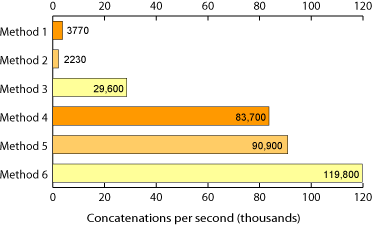В результате комментариев в моем ответе на этот поток я хотел знать, что разница в скорости между оператором += и ''.join()
Итак, каково сравнение скорости между двумя?
В результате комментариев в моем ответе на этот поток я хотел знать, что разница в скорости между оператором += и ''.join()
Итак, каково сравнение скорости между двумя?
От: Эффективная конкатенация строк
Метод 1:
def method1():
out_str = ''
for num in xrange(loop_count):
out_str += 'num'
return out_str
Способ 4:
def method4():
str_list = []
for num in xrange(loop_count):
str_list.append('num')
return ''.join(str_list)
Теперь я понимаю, что они не являются строго репрезентативными, и 4-й метод присоединяется к списку перед повторением и объединением каждого элемента, но это справедливое указание.
Связывание строк значительно быстрее, чем конкатенация.
Почему? Строки неизменяемы и не могут быть изменены на месте. Чтобы изменить один, необходимо создать новое представление (конкатенация двух).

Мой исходный код был неправильным, кажется, что конкатенация + обычно быстрее (особенно с более новыми версиями Python на более новом оборудовании)
Время выглядит следующим образом:
Iterations: 1,000,000
Python 3.3 для Windows 7, Core i7
String of len: 1 took: 0.5710 0.2880 seconds
String of len: 4 took: 0.9480 0.5830 seconds
String of len: 6 took: 1.2770 0.8130 seconds
String of len: 12 took: 2.0610 1.5930 seconds
String of len: 80 took: 10.5140 37.8590 seconds
String of len: 222 took: 27.3400 134.7440 seconds
String of len: 443 took: 52.9640 170.6440 seconds
Python 2.7 на Windows 7, Core i7
String of len: 1 took: 0.7190 0.4960 seconds
String of len: 4 took: 1.0660 0.6920 seconds
String of len: 6 took: 1.3300 0.8560 seconds
String of len: 12 took: 1.9980 1.5330 seconds
String of len: 80 took: 9.0520 25.7190 seconds
String of len: 222 took: 23.1620 71.3620 seconds
String of len: 443 took: 44.3620 117.1510 seconds
В Linux Mint, Python 2.7, более медленный процессор
String of len: 1 took: 1.8840 1.2990 seconds
String of len: 4 took: 2.8394 1.9663 seconds
String of len: 6 took: 3.5177 2.4162 seconds
String of len: 12 took: 5.5456 4.1695 seconds
String of len: 80 took: 27.8813 19.2180 seconds
String of len: 222 took: 69.5679 55.7790 seconds
String of len: 443 took: 135.6101 153.8212 seconds
И вот код:
from __future__ import print_function
import time
def strcat(string):
newstr = ''
for char in string:
newstr += char
return newstr
def listcat(string):
chars = []
for char in string:
chars.append(char)
return ''.join(chars)
def test(fn, times, *args):
start = time.time()
for x in range(times):
fn(*args)
return "{:>10.4f}".format(time.time() - start)
def testall():
strings = ['a', 'long', 'longer', 'a bit longer',
'''adjkrsn widn fskejwoskemwkoskdfisdfasdfjiz oijewf sdkjjka dsf sdk siasjk dfwijs''',
'''this is a really long string that so long
it had to be triple quoted and contains lots of
superflous characters for kicks and gigles
@!#(*_#)(*$(*!#@&)(*E\xc4\x32\xff\x92\x23\xDF\xDFk^%#$!)%#^(*#''',
'''I needed another long string but this one won't have any new lines or crazy characters in it, I'm just going to type normal characters that I would usually write blah blah blah blah this is some more text hey cool what crazy is that it looks that the str += is really close to the O(n^2) worst case performance, but it looks more like the other method increases in a perhaps linear scale? I don't know but I think this is enough text I hope.''']
for string in strings:
print("String of len:", len(string), "took:", test(listcat, 1000000, string), test(strcat, 1000000, string), "seconds")
testall()
Это то, что глупые программы предназначены для тестирования:)
Использовать плюс
import time
if __name__ == '__main__':
start = time.clock()
for x in range (1, 10000000):
dog = "a" + "b"
end = time.clock()
print "Time to run Plusser = ", end - start, "seconds"
Вывод:
Time to run Plusser = 1.16350010965 seconds
Теперь с join....
import time
if __name__ == '__main__':
start = time.clock()
for x in range (1, 10000000):
dog = "a".join("b")
end = time.clock()
print "Time to run Joiner = ", end - start, "seconds"
Выход:
Time to run Joiner = 21.3877386651 seconds
Итак, на python 2.6 на windows я бы сказал, что + примерно в 18 раз быстрее, чем join:)
Я переписал последний ответ, может, пожалуйста, поделитесь своим мнением о том, как я тестировал?
import time
start1 = time.clock()
for x in range (10000000):
dog1 = ' and '.join(['spam', 'eggs', 'spam', 'spam', 'eggs', 'spam','spam', 'eggs', 'spam', 'spam', 'eggs', 'spam'])
end1 = time.clock()
print("Time to run Joiner = ", end1 - start1, "seconds")
start2 = time.clock()
for x in range (10000000):
dog2 = 'spam'+' and '+'eggs'+' and '+'spam'+' and '+'spam'+' and '+'eggs'+' and '+'spam'+' and '+'spam'+' and '+'eggs'+' and '+'spam'+' and '+'spam'+' and '+'eggs'+' and '+'spam'
end2 = time.clock()
print("Time to run + = ", end2 - start2, "seconds")
ПРИМЕЧАНИЕ. Этот пример написан на Python 3.5, где range() действует как прежний xrange()
Выход я получил:
Time to run Joiner = 27.086106206103153 seconds
Time to run + = 69.79100515996426 seconds
Лично я предпочитаю '.join([]) по пути "Plusser", потому что он более чистый и читаемый.